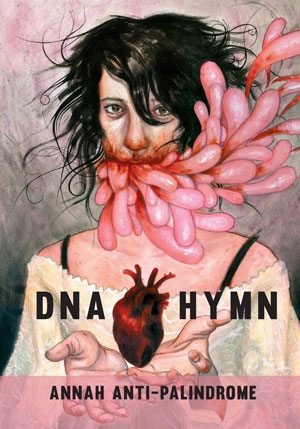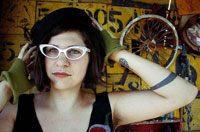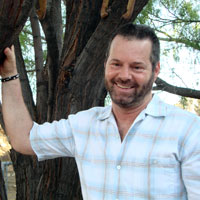
DNA Hymn
by Annah Anti-Palindrome
Sibling Rivalry Press, 68 pages
reviewed by Johnny Payne
Purchase this book to benefit Cleaver
The disturbing cover art of DNA Hymn features a woman whose bloody mouth discharges what appear to be balloons, intestines, or giant molecules. The image seems apt for a collection of poems that freely disgorges both intelligence and emotional wisdom. This book by the semi-pseudonymous Annah Anti-Palindrome waxes conceptual to be sure, but not to the point where each individual poem is negated by an overarching Big Idea. In the introduction, the author explains that “resisting palindromes” derives from her mother’s morphine overdose and her desire as a daughter, both linguistic and existential, to break out of a legacy of violence. The first poem, “extraction,” fittingly takes an epidural as its footnote and birth as its subject: “tooth tile milk moon marrow . clock jaw limb socket hollow ./ split hair curl coil crescent . wet nest yolk part swallow .”
From the first line, we are caught in hypnotic, intuitive sound play, as the poet concisely charts her emergence into a scene of what I can only describe as “traumatic ecstasy.” Many memoirs of personal pain in poetic form exist. What distinguishes this one is its tough-minded decision not to exploit itself, and its tender affection for the upsides of a garish horror show. The book’s emotional honesty reminds us that children will find a way of explaining life to themselves in any circumstance. And this fact gets layered with the linguistic drive of the poet as protagonist, such as this staged scene in utero while the mother drinks booze:
we were a battleground of slippery fetal flesh
digestion sounds punctured the fluid of peace
as she passed us amniotic, toxic drinks
ultrasound waves rocked us to sonic, chemical sleep
The “hymn” portion of DNA Hymn is evident everywhere, nowhere more so than in “middle C,” a portrait of the mother and her familiars in all their glorious and tawdry imperfection:
the women who raised us
smoked a lot & punctuated their wet-coughs with laughter
let their tits spill out over elastic tube top fringe
wore budget beauty blood-orange mouth paint
had pores pooled with poorly matched cosmetic paste
One of the most surprising poems, “early escapisms,” chronicles the innocent eroticism of the pass-out game, in which the speaker and her friend, both young girls, take turns choking each other into near unconsciousness. The episode gets recounted as a minor rapture, an awakening of bodily desire, and metaphorically reinforces the book’s credo that one way of coping with the terror of existence, and having some control over it, is simply to learn how to turn pain into pleasure.
she cut off my air supply & I was in love
sunshine-capillary tint through closed eyelids
raw, pink, viscous
a bowl of salmon roe
a ruptured gestational sac . . .
when she shook me awake: pop fizz gasp jolt
a soft & tender, plum colored ache
tingly lips and heavy sponge tongue
post asphyxia
intoxication
One could speak of these poems as feminist, or one could simply say that the poet has keen insight into the human condition (her own condition) and within that, the condition of woman. Nowhere does this reality show more clearly than in the trenchant, witty, poison-tinged “saccharin.”
this gender [is] a tampon full of pop rocks
the mace you thought was breath spray
the tattoo you most regret
a parable …..of faded….. but legible…..mistakes

DNA Hymn, however, contains a great deal of thematic and stylistic variety. There are poems about sunflowers, doorknobs, artichokes, and earwax. There is a well-turned verbal imitation of a sonata. There are experimental poems about chromosomes and palindromes, explorations of the space and structure of the page, of the interplay between figurative indeterminacy and startling clarity. In the end, Annah Anti-Palindrome errs on the side of clarity, and from the decision to take a hard look at everything behind her, is born the book’s sense of urgency.
The most hair-raising poem, the one that most affords a cool pathos, a mocking affection, an unflinching view of the mother who eventually died from an overdose, is “valley to the bay.” In it, the just-emerged fetus sees the umbilical cord and imagines it as a rope. With a cynical tone, the newborn coldly appraises the situation, already trapped in a future hell of a drug-addicted mother:
the first time I met you
you were breathless & grey
from a navel cord noose ……………….
………………..………………..……………….a low swinging pendulum
………………..………………..……………….heavy as copper
………………..………………..……………….slick as motor oil
everyone in the delivery room was freaking out & I thought—
you brilliant little shit
………………..………………..……………….did you just manage to use your own life line
………………..………………..……………….as a prop in your first suicide attempt?
This is mature poetics. The poem turns into a time capsule of the mother’s survival, despite herself, of various suicide attempts.
2010:
found
face down on a piss-stained mattress
cartoon network blasting
from a foil-crowned television set
the hypodermic haunt
of poppy sap
fermenting the blood
………………..………………..………………..guts full of soma capsule bobbers
………………..………………..………………..in a lake of bile
………………..………………..………………..& chocolate milk
DNA Hymn is a book with clear themes boldly stated, yet it is full of surprises. It has been written in a mood of critical compassion without a surfeit of sentiment. Its final words of qualified redemption leave us in exactly the right place: “there is always a sweet spot / between calloused and bleeding.”

Johnny Payne is Director of the MFA in Creative Writing at Mount Saint Mary’s University, Los Angeles. His most recent book of poetry is Vassal. Forthcoming is the poetry collection Heaven of Ashes, from Mouthfeel Press.
Read more from Cleaver Magazine’s Book Reviews.



